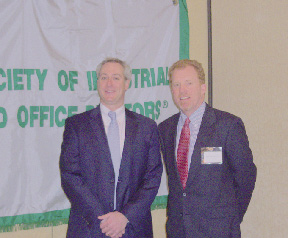The New England Chapter of SIOR held its monthly breakfast event at the Newton Marriott on Tuesday, February 24th as approximately 38 SIORs and guests attended. The guest speaker was Robert Keeley, Jr., president of Diversified Project Management of Newton, who discussed what are project management services and the duties of being an owner representative. Keeley gave a quick overview and profile of the company. Diversified Project Management is an independent owner's representative firm founded in 1989 with the mission of providing maximum value to its clients through the objective and diligent representation of their real estate interests. With offices in Boston, Hartford and Stamford, and a staff of approximately 55 people, they have grown to become one of the premier project management firms in New England.
Here is a summary of Keeley's presentation:
What is Project Management?
The service acts as an extension of the owner's best interest in construction. The service is the glue that holds the project together. Keeley with some jest recognized that there are 6 phases of an end-user's project.
1. Enthusiasm
2. Disillusionment
3. Panic
4. Search for the guilty
5. Punishment of the Innocent and
6. Praise and honors for the non-participant
What does a Project Management do?
There is a long list of work that can include establishing the correct square footage needed; setting a realistic budget and schedule; conducting site due diligence; conducting a "stay" vs. "go" analysis reduce project risk; protecting the client relationship by keeping a real estate broker from being dragged into the details.
Why would a client need a PM?
Usually the need is project specific or it might be to serve as an outsourced real estate personnel. PM provides technical expertise and can provide coverage in geographical areas that a client has no vendor relationship. From an accounting standpoint, an outsourced vendor such as PM, invoices to a project rather than the company's operating budget.
What is the Role of PM?
The role is to serve as a central point for a project team. A PM can serve as a facilitator and team builder and keep a budget on schedule. Keeley continued by breaking down a case study of how an owner rep service could be used on a project and interestingly the service is used by architects and design/build firms such as Dacon which is an SIOR Chapter member.
He started with Phase I, Programming and Pre-Construction. During the transaction, the services would:
* Provide a High/Low Budget. It provides a sanity check for a client to see if they can afford the project.
* Provide a Summary Schedule
Phase II, Project Management & Construction Administration provides the following:
* Vendor RFP's to be able to compare equally
* Creates a bid form, cost evaluation sheets, meeting notes, monthly progress report and keeps people accountable
Phase III, FF&E Coordination & Move Management encompasses:
* Occupancy phasing schedule, space assignments
* Act as "grief" counselor on moving and telecom computer cutovers
* Offers instructions on how to pack files
* Provides a Move-In Welcome Package
* Makes sure email is operating and has a Move-In letter
Keeley concluded the program with some cost benchmarking data and how he sees vendor costs in the market at this point:
* Architects:$1.25-4 per s/f
* Engineering:$0.75-1.25 per s/f
* GC fees:2-6%
* TI costs: $40-55 per s/f for non-union and $80-95 per s/f for union
* Voice/Data Cabling: $400-500 per drop
* Movers $1 per s/f (or $250-450 per person)
PM Fees can also range as follows:
* Project and pre-construction: $0.25-0.75 per s/f
* Project and Construction Administration: $0.75-1.25 per s/f
* Relocation Management: $0.50-0.75 per s/f
* Furniture: New $2,000-4,000 per workstation; Used: $800-1,200 per workstation and remanufactured furniture; $1,500 per workstation
* Kelley's firm as an owner's rep charges hourly. Hourly rates average approximately $100 per hour. The minimum size project that PM is feasible is 10,000 s/f and his firm can work up to 100,000 s/f. A project's mean time is 9 months. As an example, for a 20,000 s/f project, schematic design is 4-8 weeks, construction docs 4-6 weeks; permitting 2-6 weeks; construction 8-16 weeks; furniture ordering, delivery and installation 16-20 weeks; hiring the mover 4-8 weeks. Some of these times overlap so it is not a total of 1.5 years.
In the end, a PM service can save a client a great deal of time and money. The client can be working on its own clients and not have to take personnel away from company work to be engaged in a detailed project.
The Chapter would like to thank Jim Boudrot and Ned Leeming for organizing another great event.
Tags:









.png)